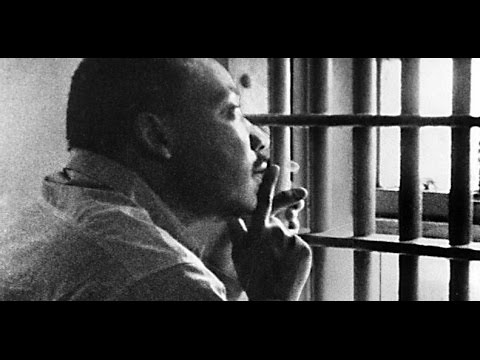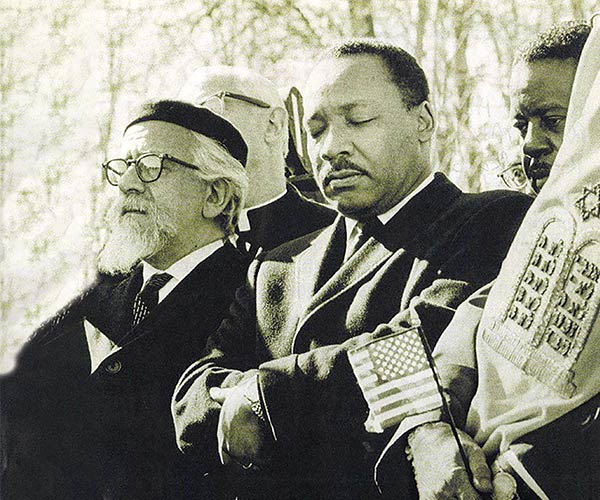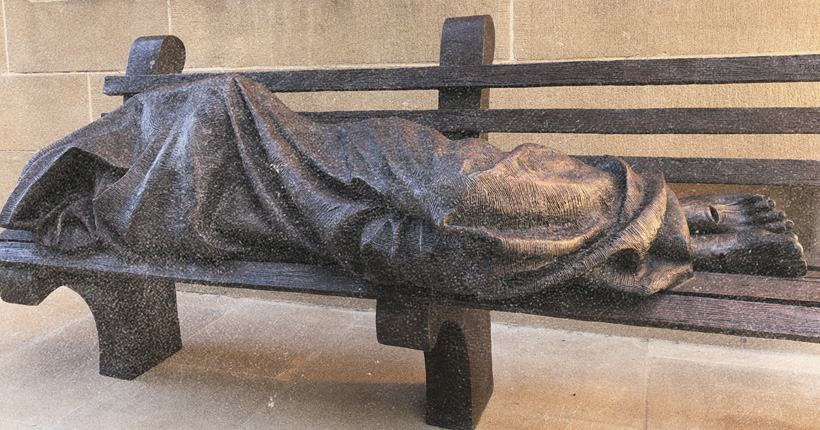It’s MLK weekend, so churches and faith-based organizations all over the United States, and around the world, will honor Dr. King’s legacy and the justice work that he spearheaded as part of the Civil Rights movement. While I’ve been reflecting on his legacy and what it means for my context, I’ve also been recently reflecting on the ethical implications of theology more generally. I recently reviewed a ‘four views’ book on the doctrine of “divine impassibility,” a concept I argued in my review has a lot to say about the problem of evil and how God is dealing with it. These thoughts also coincide with the release of Just Mercy, the film adaptation of the book by Bryan Stevenson about his justice work among inmates on death row. I’m seeing all kinds of connections that have me asking, “What does justice work have to do with the nature of God?”
 Dr. King’s theology was deeply shaped by the Cross of Jesus. Not only did Dr. King see his own personal salvation accomplished by Jesus, with the Cross as pivotal, he also saw the Cross as a powerful ethical guide and model for social transformation. The Cross was at the heart of his justice work:
Dr. King’s theology was deeply shaped by the Cross of Jesus. Not only did Dr. King see his own personal salvation accomplished by Jesus, with the Cross as pivotal, he also saw the Cross as a powerful ethical guide and model for social transformation. The Cross was at the heart of his justice work:
 Bryan Stevenson also understands this truth about suffering, even if he’s never articulated it in as explicitly theological terms as Dr. King. Bryan Stevenson’s justice work has always been an outflow of his personal connection to the struggle for justice among African Americans and his deep-seated sense of justice borne of his Christian faith. The Cross is clearly seen in how Bryan Stevenson goes about his justice work and was captured beautifully in a scene from the newly released film.
In the scene, Stevenson has just seen his last ditch attempts fail to save the life of a man convicted of murder from receiving the death penalty. He promised that client that he would witness his execution and it was Stevenson’s first time. Traumatized and dejected he sat by the river talking to his associate about how he felt like a failure. But she saw something he didn’t. She saw that his personal suffering on behalf of his clients was a source of strength and solidarity. She said she’d been told that lawyers should never get too emotionally involved with their cases, but that because of Stevenson’s example, she now knew that was “bullsh*t.” It was because Stevenson entered into their pain and suffering that he was able to be as effective as he is at being their champion.
Bryan Stevenson also understands this truth about suffering, even if he’s never articulated it in as explicitly theological terms as Dr. King. Bryan Stevenson’s justice work has always been an outflow of his personal connection to the struggle for justice among African Americans and his deep-seated sense of justice borne of his Christian faith. The Cross is clearly seen in how Bryan Stevenson goes about his justice work and was captured beautifully in a scene from the newly released film.
In the scene, Stevenson has just seen his last ditch attempts fail to save the life of a man convicted of murder from receiving the death penalty. He promised that client that he would witness his execution and it was Stevenson’s first time. Traumatized and dejected he sat by the river talking to his associate about how he felt like a failure. But she saw something he didn’t. She saw that his personal suffering on behalf of his clients was a source of strength and solidarity. She said she’d been told that lawyers should never get too emotionally involved with their cases, but that because of Stevenson’s example, she now knew that was “bullsh*t.” It was because Stevenson entered into their pain and suffering that he was able to be as effective as he is at being their champion.
 Rabbi Abraham Joshua Heschel marched with Dr. King in the South during the Civil Rights movement and is famous for saying it was like they were “praying with their feet.” (How amazing would it be if more professing followers of Jesus in the U.S. ‘prayed with their feet’?!) Heschel knew what many American Christians do not: that the God of the Bible is a God of Pathos (“passions”). The God revealed by the Hebrew prophets is a God who passionate loves and is passionately moved by God’s people—by their faithfulness and unfaithfulness, by their worship and by their idolatry. Heschel famously destroyed any notion that Greek conceptions of God are compatible with the Hebraic conception of God delivered by the prophets.
Rabbi Abraham Joshua Heschel marched with Dr. King in the South during the Civil Rights movement and is famous for saying it was like they were “praying with their feet.” (How amazing would it be if more professing followers of Jesus in the U.S. ‘prayed with their feet’?!) Heschel knew what many American Christians do not: that the God of the Bible is a God of Pathos (“passions”). The God revealed by the Hebrew prophets is a God who passionate loves and is passionately moved by God’s people—by their faithfulness and unfaithfulness, by their worship and by their idolatry. Heschel famously destroyed any notion that Greek conceptions of God are compatible with the Hebraic conception of God delivered by the prophets.
Dr. King and the Cross
 Dr. King’s theology was deeply shaped by the Cross of Jesus. Not only did Dr. King see his own personal salvation accomplished by Jesus, with the Cross as pivotal, he also saw the Cross as a powerful ethical guide and model for social transformation. The Cross was at the heart of his justice work:
Dr. King’s theology was deeply shaped by the Cross of Jesus. Not only did Dr. King see his own personal salvation accomplished by Jesus, with the Cross as pivotal, he also saw the Cross as a powerful ethical guide and model for social transformation. The Cross was at the heart of his justice work:
There are some who still find the cross a stumbling block, and others consider it foolishness, but I am more convinced than ever before that it is the power of God unto social and individual salvation. So like the Apostle Paul I can now humbly yet profoundly say, ‘I bear in my body the marks of the Lord Jesus.’ The suffering and agonizing moments through which I have passed over the last few years have also drawn me closer to God. More than ever before I am convinced of the reality of a personal God. [1]Dr. King is not alone in experiencing fellowship with God in the midst of suffering. In fact, this is what the Apostle Paul speaks of directly: “I want to know Christ—yes, to know the power of his resurrection and participation in his sufferings, becoming like him in his death…” (Phil. 3.10) People like the ‘power of the resurrection’ part a lot more than the ‘participation in his sufferings’ part. But, for Dr. King and the Apostle Paul, this fellowship with Christ through suffering was a profound experience of union. In fact, Dr. King saw this sharing in Christ’s suffering as a way of transmuting evil into healing power!
Recognizing the necessity for suffering I have tried to make of it a virtue. If only to save myself from bitterness, I have attempted to see my personal ordeals as an opportunity to transform myself and heal the people involved in the tragic situation which now obtains. I have lived these last few years with the conviction that unearned suffering is redemptive. [2]Here, Dr. King echoes another Apostle who shared in Jesus’s suffering and saw it as redemptive:
For it is commendable if someone bears up under the pain of unjust suffering because they are conscious of God. But how is it to your credit if you receive a beating for doing wrong and endure it? But if you suffer for doing good and you endure it, this is commendable before God. To this you were called, because Christ suffered for you, leaving you an example, that you should follow in his steps. “He committed no sin, and no deceit was found in his mouth.” When they hurled their insults at him, he did not retaliate; when he suffered, he made no threats. Instead, he entrusted himself to him who judges justly. “He himself bore our sins” in his body on the cross, so that we might die to sins and live for righteousness; “by his wounds you have been healed.” — I Peter 2.19-24For the Apostles Peter and Paul, and for Dr. King, the suffering of Jesus isn’t a shameful thing we must somehow explain away, but the source of power for personal healing and social transformation.
Just Mercy
 Bryan Stevenson also understands this truth about suffering, even if he’s never articulated it in as explicitly theological terms as Dr. King. Bryan Stevenson’s justice work has always been an outflow of his personal connection to the struggle for justice among African Americans and his deep-seated sense of justice borne of his Christian faith. The Cross is clearly seen in how Bryan Stevenson goes about his justice work and was captured beautifully in a scene from the newly released film.
In the scene, Stevenson has just seen his last ditch attempts fail to save the life of a man convicted of murder from receiving the death penalty. He promised that client that he would witness his execution and it was Stevenson’s first time. Traumatized and dejected he sat by the river talking to his associate about how he felt like a failure. But she saw something he didn’t. She saw that his personal suffering on behalf of his clients was a source of strength and solidarity. She said she’d been told that lawyers should never get too emotionally involved with their cases, but that because of Stevenson’s example, she now knew that was “bullsh*t.” It was because Stevenson entered into their pain and suffering that he was able to be as effective as he is at being their champion.
Bryan Stevenson also understands this truth about suffering, even if he’s never articulated it in as explicitly theological terms as Dr. King. Bryan Stevenson’s justice work has always been an outflow of his personal connection to the struggle for justice among African Americans and his deep-seated sense of justice borne of his Christian faith. The Cross is clearly seen in how Bryan Stevenson goes about his justice work and was captured beautifully in a scene from the newly released film.
In the scene, Stevenson has just seen his last ditch attempts fail to save the life of a man convicted of murder from receiving the death penalty. He promised that client that he would witness his execution and it was Stevenson’s first time. Traumatized and dejected he sat by the river talking to his associate about how he felt like a failure. But she saw something he didn’t. She saw that his personal suffering on behalf of his clients was a source of strength and solidarity. She said she’d been told that lawyers should never get too emotionally involved with their cases, but that because of Stevenson’s example, she now knew that was “bullsh*t.” It was because Stevenson entered into their pain and suffering that he was able to be as effective as he is at being their champion.
The God of Pathos
 Rabbi Abraham Joshua Heschel marched with Dr. King in the South during the Civil Rights movement and is famous for saying it was like they were “praying with their feet.” (How amazing would it be if more professing followers of Jesus in the U.S. ‘prayed with their feet’?!) Heschel knew what many American Christians do not: that the God of the Bible is a God of Pathos (“passions”). The God revealed by the Hebrew prophets is a God who passionate loves and is passionately moved by God’s people—by their faithfulness and unfaithfulness, by their worship and by their idolatry. Heschel famously destroyed any notion that Greek conceptions of God are compatible with the Hebraic conception of God delivered by the prophets.
Rabbi Abraham Joshua Heschel marched with Dr. King in the South during the Civil Rights movement and is famous for saying it was like they were “praying with their feet.” (How amazing would it be if more professing followers of Jesus in the U.S. ‘prayed with their feet’?!) Heschel knew what many American Christians do not: that the God of the Bible is a God of Pathos (“passions”). The God revealed by the Hebrew prophets is a God who passionate loves and is passionately moved by God’s people—by their faithfulness and unfaithfulness, by their worship and by their idolatry. Heschel famously destroyed any notion that Greek conceptions of God are compatible with the Hebraic conception of God delivered by the prophets.
Prophecy consists in the inspired communication of divine attitudes to the prophetic consciousness. As we have seen, the divine pathos is the ground-tone of all these attitudes. A central category of the prophetic understanding for God, it is echoed in almost every prophetic statement. To the prophet, we have noted, God does not reveal himself in an abstract absoluteness, but in a personal and intimate relation to the world. He does not simply command and expect obedience. He is also moved and affected by what happens in the world, and reacts accordingly. Events and human actions arouse in Him joy or sorrow, pleasure or wrath. He is not conceived as judging the world in detachment. He reacts in an intimate and subjective manner, and this determines the value of events. Quite obviously in the biblical view, man’s deeds may move Him, affect Him, grieve Him or, on the other hand, gladden and please Him. This notion that God can be intimately affected, that He possesses not merely intelligence and will, but also pathos, basically defines the prophetic consciousness of God. The God of the philosophers is like the Greek ananke, unknown and indifferent to man; He thinks, but does not speak; He is conscious of Himself, but oblivious to the world; while the God of Israel is a God Who loves, a God Who is Known to, and concerned with, man. He not only rules the world in the majesty of His might and wisdom, but reacts intimately to the events of history. He does not judge men’s deeds impassively and with aloofness; His judgment is imbued with the attitude of One to Whom those actions are of the most intimate and profound concern. God does not stand outside the range of human suffering and sorrow. He is personally involved in, even stirred by, the conduct and fate of man. [3]Like the Apostles, Dr. King, and Bryan Stevenson, Heschel knows that God is close to those who are suffering because the God of the Bible is a God who suffers with us.
The Failure of Impassibility Apologetics
But since the publishing of The Crucified God by Jürgen Moltmann, there’s been a resurgence of Christian theologians doubling down on the ancient Greek concept of “divine impassibility” [4] that was accommodated by some of the earliest Christian thinkers. They often used the language of Greek philosophy while simultaneously subverting its meaning where it conflicted with the story of Jesus—as it clearly does when it comes to suffering. But this new wave of impassibility apologists have been so prolific in their writing that IVP felt it was necessary to devote an entire counterpoints-stye monograph to this subject. As I stated in my two-part review, the book confirmed all my suspicions about this new moment—that it isn’t based on biblical exegesis, that it instead depends upon idiosyncratic interpretations of the so-called “church fathers,” that it privileges tradition above reason, and that it ultimately supports a deterministic/fatalistic conception of God. In the end, three of the four contributors abandoned or outright rejected “impassibility,” exemplified by this mic-drop excerpt:Given that impassibility is not affirmed in Scripture (semantically or conceptually) and given the confusion and diversity of meanings associated with this term in past and present theology, I wonder whether its utility is far too slight to warrant continued use, particularly if we aim for clarity in theological communication. To his credit, Castelo recognizes: ‘It could very well be the case that the language of divine impassibility has run its course and that new terms need to replace it.’ Robert Jenson goes further, stating, ‘I am more or less aware of the subtle qualifications and real insights involved in the tradition’s sophisticated massaging of the notion of impassibility. But in any sense of impassibility perceptible on the face of the word, it will not do as an attribute of the God of Scripture and dogma.’ [5]We’ve finally turned the corner from this unfortunate season in theological scholarship, when otherwise intelligent and serious people fought hard to preserve a faulty and unhelpful concept. Thankfully, today’s ministers and justice workers are all but oblivious to this academic debate. For them, the truths that Dr. King, Abraham Joshua Heschel, and Bryan Stevenson embody have always been the most self-evident. To do God’s work, you have to enter into God’s suffering love for people.
Justice Work and the Nature of God
Perhaps the same Apostle to whom I Peter is attributed is also the author of II Peter. If so, it would make sense of what is written in the first chapter:His divine power has given us everything we need for a godly life through our knowledge of him who called us by his own glory and goodness. Through these he has given us his very great and precious promises, so that through them you may participate in the divine nature, having escaped the corruption in the world caused by evil desires. — II Peter 1.3-4Participation in the divine nature isn’t only being caught up in the self-giving, independent, blissful love that is shared between the Father, Son, and Holy Spirit—though it is that; it is also being caught up in the Pathos of God, the suffering love of God for God’s people. In the end, all those who strive to see God’s shalom realized on earth as it is in heaven know well that Bonhoeffer was right: “Only a suffering God can help.” [6]
- Martin Luther King, Jr. “Suffering and Faith,” in A Testament of Hope (HarperOne, 1986), p.42.
- Ibid., p.41.
- Abraham Joshua Heschel, The Prophets, Vol. II (Harper Torchbooks, 1962), pp.3-4.
- Examples include: Paul L. Gavrilyuk; Thomas Weinandy; Rob Lister; Richard Creel; Paul Fiddes, just to name a few.
- Robert Matz and A. Chadwick Thornhill Ed., Divine Impassibility: Four Views (InterVarsity Press, 2019), p.107-108.
- Dietrich Bonhoeffer, Letters and Papers from Prison (London: SCM Press, 1967), p. 361.


